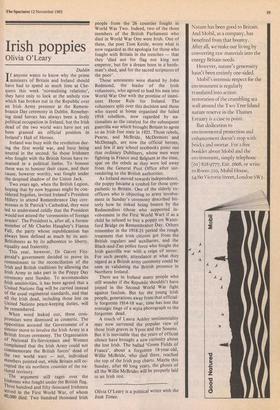Irish poppies
Olivia O'Leary
Dublin
If anyone wants to know why the prime ministers of Britain and Ireland should have had to spend so much time at Che- quers this week 'normalising relations', they have only to look at the unholy row which has broken out in the Republic over an Irish Army presence at the Remem- brance Day ceremony in Dublin. Remeber- ing dead heroes has always been a lively political occupation in Ireland, but the Irish dead of the two world wars have not yet been granted an official position in Ireland's Hall of Heroes.
Ireland was busy with the revolution dur- ing the first world war, and busy being neutral in the second. So those Irishmen who fought with the British forces have re- mained in a political limbo. To honour them was to honour their cause, and their cause, however worthy, was fought under the despised shadow of the Union Jack.
Two years ago, when the British Legion, hoping that by now bygones might be con- sidered bygones, invited Ireland's President Hillery to attend Remembrance Day cere- monies in St Patrick's Cathedral, they were led to understand coldly that the President Would not attend the 'ceremonies of foreign armies'. The President is, after all, a former member of Mr Charles Haughey's Fianna Fail, the party whose republicanism has always been defined as much by its anti- Britishness as by its adherence to liberty, equality and fraternity.
This year, however, Dr Garret Fitz- gerald's government decided to prove its Commitment to the reconciliation of the Irish and British traditions by allowing the Irish Army to take part in the Poppy Day ceremony next Sunday. To accommodate Irish sensitivities, it has been agreed that a United Nations flag will be carried instead of the usual regimental standards, and that all the Irish dead, including those lost on United Nations peace-keeping duties, will be remembered.
When word leaked out, these com- promises were dismissed as cosmetic. The opposition accused the Government of a sinister move to involve the Irish Army in a British forces ceremony. The Organisation of National Ex-Servicemen and Women Complained that the Irish Army could not Commemorate the British forces' dead of the two world wars — not, individual Members pointed out, while Britain still oc- euriled the six northern counties of the na- tional territory. ,The argument still rages over the Irishmen who fought under the British flag. Three hundred and fifty thousand Irishmen served in the First World War, of whom 40,000 died. Two hundred thousand Irish
people from the 26 counties fought in World War Two. Indeed, two of the three members of the British Parliament who died in World War One were Irish. One of them, the poet Tom Kettle, wrote what is now regarded as the apologia for those who fought with Britain in the trenches — that they 'died not for flag nor king nor emperor, but for a dream born in a herds- man's shed, and for the sacred scriptures of the poor'.
Those sentiments were shared by John Redmond, the leader of the Irish volunteers, who agreed to lead his men into World War One with the promise of immi- nent Home Rule for Ireland. The volunteers split over this decision and those who stayed at home organised the failed 1916 rebellion, now regarded by na- tionalists as the catalyst for the subsequent guerrilla war which brought Britain to agree to an Irish free state in 1921. Those rebels, Pearse, and McBride, McDermott and McDonagh, are now the official heroes, and few if any school textbooks point out that ordinary Dubliners, whose men were fighting in France and Belgium at the time, spat on the rebels as they were led away from the General Post Office after sur- rendering to the British authorities.
As Ireland moved towards independence, the poppy became a symbol for those sym- pathetic to Britain. One of the elderly ex- officers who is objecting to army involve- ment in Sunday's ceremony described bit- terly how he risked being beaten by the Redmondites (those who supported in- volvement in the First World War) if as a child he refused to buy a poppy on Water- ford Bridge on Remembrance Day. Others remember in the 1918-21 period the rough treatment that Irish citizens got from the British regulars and auxiliaries, and the Black-and-Tan police force who fought the Irish guerrilla war with a reign of terror. For such people, attendance at what they regard as a British army ceremony could be seen as validating the British presence in Northern Ireland.
There are in Ireland many people who still wonder if the Republic shouldn't have joined in the Second World War fight against fascism. But for the young Irish people, generations away from that official- ly forgotten 1914-18 war, time has lent the nostalgic tinge of a sepia photograph to the forgotten dead.
A touch of Laura Ashley sentimentality may now surround the popular view of those Irish graves in Ypres and the Somme. But it is inevitable that the years of official silence have brought a new curiosity about the lost Irish. The ballad 'Green Fields of France', about a forgotten 18-year-old, Willie McBride, who died there, reached the top of the Irish pop charts. Maybe this Sunday, after 60 long years, the ghosts of all the Willie McBrides will be properly laid to an Irish rest.
Olivia O'Leary is a political writer with the Irish Times.














































 Previous page
Previous page